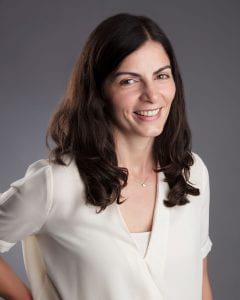 Meet Christine Valente, Reader, or ‘Associate Professor’ in Economics at University of Bristol
Meet Christine Valente, Reader, or ‘Associate Professor’ in Economics at University of Bristol
We caught up with Dr Christine Valente from the Department of Economics at University of Bristol, to find out why she chose a career in economics, to learn about her research focus and to find out who and what she is inspired by.
Can you tell us a little about your role within the department and what your research covers?
Sure. I am a Reader or ‘Associate Professor’ in Economics. Other than my teaching and research, my main contribution to the department at the moment is towards the recruitment of new lecturers and the preparation of an Athena Swan application. Athena Swan is a UK-based certification in recognition of commitment to gender equality. As part of this application, the working group is also thinking more broadly about promoting inclusiveness beyond gender equality.
In my research, I focus on understanding how households in poor countries make decisions about fertility and investments in child human capital (health and education). I have, for example, recently evaluated the impact of alternative public programs to increase school attendance among (mostly teenage) Mozambican girls. In this joint work with Damien de Walque at the World Bank, we shed light both on how parents and children interact with respect to attendance decisions and, in doing so, identify innovative, low-cost policies to increase school attendance.
Another recent project looks at the determinants of demand for contraception, again in Mozambique, in order to understand why so many women in poor countries are not using contraception despite saying that they do not want to get pregnant and having access to affordable modern contraceptive methods.
What drew you to economics as a career path?
As far as I can remember, I have always wanted to understand how the world works so I could help make it a better place. When I first studied Economics in high school, it felt like this was the best shot I would have at achieving this goal. I really enjoyed other social sciences too, but somehow I found them rather depressing: the writings of Bourdieu, for instance, did help in making sense of the world and in particular of why people coming from low-education immigrant backgrounds like mine seemed to be stuck at the bottom of the social order. But it did not help in terms of finding practical solutions, as it felt impossible to change the order of things.
Economics is different: some things are unlikely to change quickly (preferences, culture), but people respond to incentives and incentives can often be changed by policy, so there’s hope!
What does a typical day look like for you in the department?
It varies quite a bit depending on the time of year and what projects I have going on at the time. But on average, I dedicate about three hours to face-to-face teaching or teaching-related work such as preparation, marking, supervising students, emailing students etc, about one hour and a half to administrative work (for example work related to my role in recruitment, REF preparation or Athena Swan application), and three and a half hours to research. This last part includes activities as varied as: writing-up grant proposals to get research funding, conceiving my next piece of research, analysing data, solving an economic model, working out some econometric formula, writing-up academic papers or dissemination materials, brainstorming with co-authors, engaging with policy-makers to foster research impact, reading other people’s articles to keep up-to-date or write peer-reviews.
It’s International Women’s Day coming up – do you have any role models or is there anyone who inspires you particularly?
That’s a good question. There are lots of women out there whose careers are incredibly impressive and/or whose life stories are wonderful illustrations of how hope, grit, grace and talent can prevail in the most dire circumstances – the ‘Little people, BIG DREAMS’ book collection I read with my children are full of such amazing examples. I do find the story of the Black American women who played a key role in space exploration or the story of Malala Yousafzai especially awe-inspiring. I also just love Michelle Obama.
Whether these women actually inspire me in my everyday life, I don’t know, unfortunately I don’t really experience any sense of “if they can do THAT then maybe I can do this”. I am only too aware that for each success story, there are hundreds of people (not only women) who are incredibly talented, work really hard, don’t give up, do the right thing and for whom things don’t end up quite so well. I still think that working hard, being persistent and doing the right thing are necessary ingredients for a successful life, I just don’t have this optimism that this will always translate into success.
And finally, what do you like to do when you’re not at the University?
I like to spend time really engaging with the people I love, be it family or friends. There is so much competition for our attention, I like to leave my phone somewhere and forget about it as much as possible at the weekend. I also love sports and wish I had the time to play in a team again (ideally volleyball) – until then, I run, it’s easy and it really clears my head.

